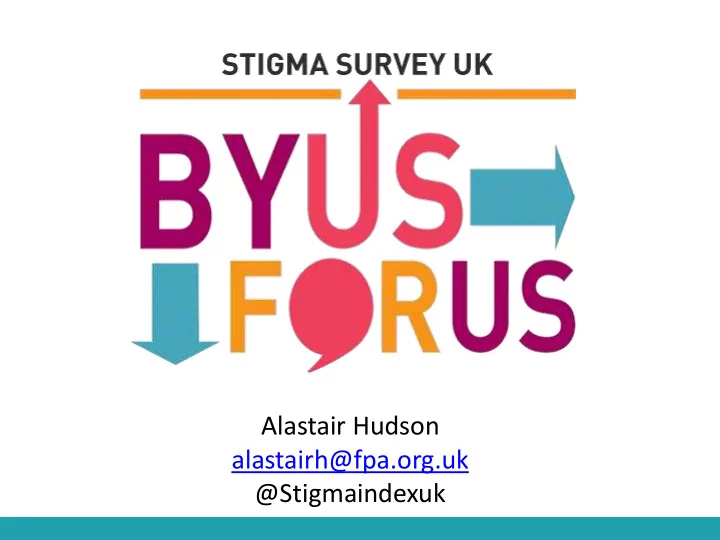

Alastair Hudson alastairh@fpa.org.uk @Stigmaindexuk
#zerodiscrimination: UNAIDS
Stigma Survey UK – 2015
Methodology 2009 Survey • 867 participants • Recruited by UK community & policy organisations • Peer-led interviews 2015 Stigma Index UK (Jan – April 2015) • 1,576 individuals • Recruited by over 120 cross sector community organisations and 46 NHS clinics • Self-completed survey online (SNAP) • Ethical approval (NHS) • Prize draw to win an iPad as incentive • 24/7 hotline - No adverse events
Measures Experiences of stigma in Different experiences of stigma: different settings: • Internalised (fear, worry) • Sexual relationships • Anticipated (avoiding situations) • Family & Friends • Enacted (treated differently)* • Work place • Disclosure control & support • Health and social care services • Pressure to disclose • Educational settings • Religious activities • Participant information: Social services • Police, prison & detention • Sex work • Age services • Use of drugs • Gender • Prisoner status • Survey tools: Ethnicity • Migrant status • Sexuality • Resilience score • Disability • PHQ2 depression screening tool
Who took part? Total: 1,576 participants
Who took part? • Majority taking ART ( 93% ) • Mean 11 years since diagnosis (range <1-34 years)
Positive Feelings 70 60 50 40 Yes No 30 Not sure 20 10 0 In control of health As good as anyone else Positive about future Positive about life
Negative Feelings 80 70 60 50 Yes 40 No Not sure 30 20 10 0 Shame Guilt Blame self Blame others Low self- Suicidal esteem
Experiences of stigma & discrimination
Awareness of HIV and support
Getting personal “None of my kids know that I’ve got HIV.” “I am a trans woman. People are White, aged 36, diagnosed still afraid of things they do not 2014 understand.” White non-British, Trans woman aged 50, diagnosed 2000 “I haven’t felt comfortable not being open about it,... I’ve found it really hard not being able to be “In my church, I’ve never really completely honest with people.” alluded to having HIV, because I don’t White, aged 36, diagnosed 2014 know how they would think.” Black woman aged 60, diagnosed 2003
Healthcare
Healthcare
Actions to Address Stigma
Conclusions & Reporting • Stigma, and discrimination continue to impact the lives of HIV positive people in the UK • Many worried about negative treatment, and some experienced HIV-related discriminatory treatment • Half of participants reported feelings of internalised stigma, and many had a poor self-image • Our data has been used as evidence by a range of stakeholders including local authorities, policy organisations (ie. APPG, NAT, HIV Scotland) for resource mobilisation, advocacy efforts, programme development and policy change • We have presented findings at national and international conferences • Full findings can be found at www.stigmaindexuk.org
Young People’s Stigma Survey UK – 2017
Who took part? ( n=300) Gender Age 2.33 1.33 60.00 53.34 46.67 50.00 40.00 Male Female 30.00 43 Non binary 53.33 20.00 Another way 10.00 0.00 15-19 20-24 Region in UK HIV acquisition 45 38.67 40 1 4.67 0.67 35 30 25 20 14.33 7.67 10.67 15 At birth 9 6.67 6.33 10 3.33 1.33 Sexually 1 1 5 29 0 IDU Don't know 64.67 Other
Positive Feelings 70 60 50 Daily 40 Weekly Monthly 30 Rarely Never 20 10 0 In control of health As good as anyone else Positive about future Positive about life
Negative Feelings 80 70 60 50 Daily Weekly 40 Monthly 30 Rarely Never 20 10 0 Shame Guilt Blame self Blame others Low self- Suicidal esteem
Dissemination & Next steps • International dissemination/knowledge exchange – Preparing abstracts for submission to national and international conferences – Academic papers and publications on both the 2015 adult and 2017 YP study datasets • Analysis of Young People’s Stigma Survey UK data • Dissemination of final report and leaflets to participating sites • Regional advocacy
Thank you Thank you to all our participants who took part in the study!
Recommend
More recommend